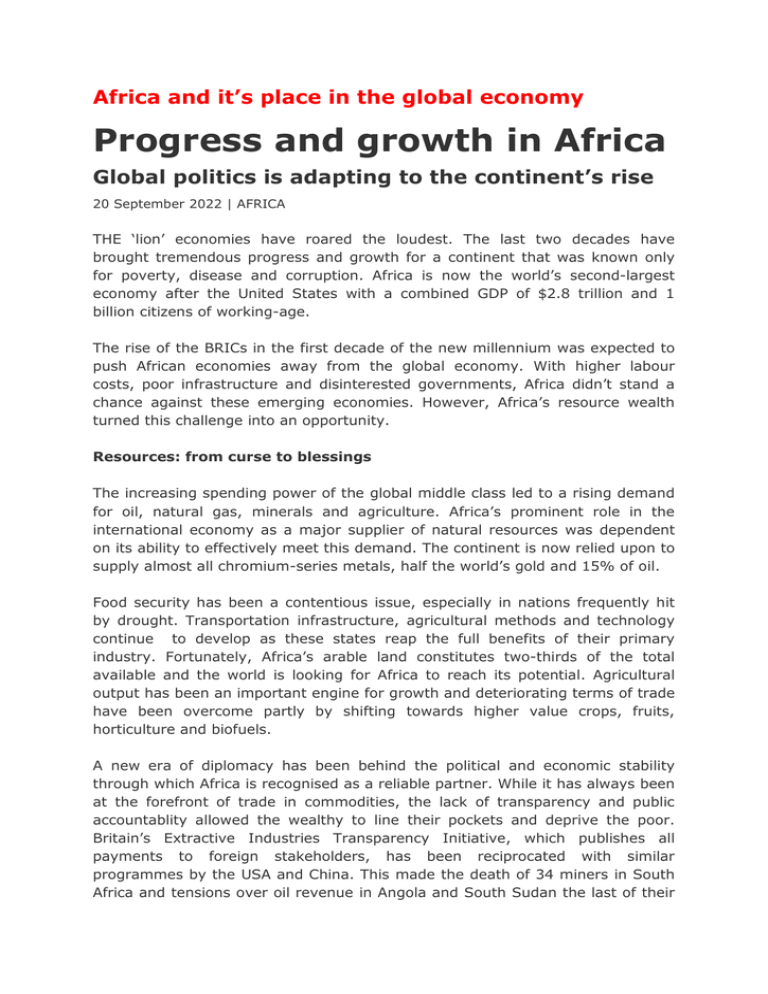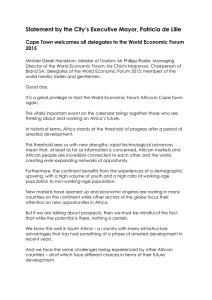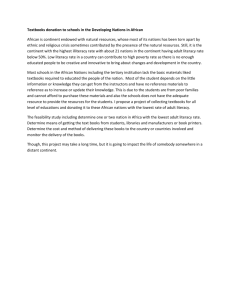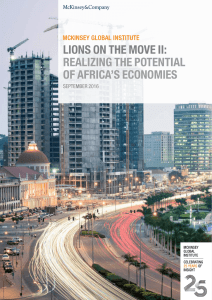Progress and growth in Africa
advertisement

Africa and it’s place in the global economy Progress and growth in Africa Global politics is adapting to the continent’s rise 20 September 2022 | AFRICA THE ‘lion’ economies have roared the loudest. The last two decades have brought tremendous progress and growth for a continent that was known only for poverty, disease and corruption. Africa is now the world’s second-largest economy after the United States with a combined GDP of $2.8 trillion and 1 billion citizens of working-age. The rise of the BRICs in the first decade of the new millennium was expected to push African economies away from the global economy. With higher labour costs, poor infrastructure and disinterested governments, Africa didn’t stand a chance against these emerging economies. However, Africa’s resource wealth turned this challenge into an opportunity. Resources: from curse to blessings The increasing spending power of the global middle class led to a rising demand for oil, natural gas, minerals and agriculture. Africa’s prominent role in the international economy as a major supplier of natural resources was dependent on its ability to effectively meet this demand. The continent is now relied upon to supply almost all chromium-series metals, half the world’s gold and 15% of oil. Food security has been a contentious issue, especially in nations frequently hit by drought. Transportation infrastructure, agricultural methods and technology continue to develop as these states reap the full benefits of their primary industry. Fortunately, Africa’s arable land constitutes two-thirds of the total available and the world is looking for Africa to reach its potential. Agricultural output has been an important engine for growth and deteriorating terms of trade have been overcome partly by shifting towards higher value crops, fruits, horticulture and biofuels. A new era of diplomacy has been behind the political and economic stability through which Africa is recognised as a reliable partner. While it has always been at the forefront of trade in commodities, the lack of transparency and public accountablity allowed the wealthy to line their pockets and deprive the poor. Britain’s Extractive Industries Transparency Initiative, which publishes all payments to foreign stakeholders, has been reciprocated with similar programmes by the USA and China. This made the death of 34 miners in South Africa and tensions over oil revenue in Angola and South Sudan the last of their kind. Significant diplomatic efforts in many areas of social development show how important Afrca’s welfare is to the rest of the world. Africa contributes more than just resources to the growth of the emerging economies. West African nations have been vital for India’s IT sector and East Africa has nurtured China’s infrastructure-building industry. "India and China need Africa," said Firmino Mucavele, Chief Executive of NEPAD. "I see in India and China an opportunity to convert our comparative advantage into competitiveness.” The latest investment frontier South-South cooperation goes a lot further than the $600 billion worth of annual agricultural output. China now imports half its energy from sub-Saharan Africa and the continent is its largest trade partner. This perfectly describes what Africa is today - a burgeoning, dynamic economy that some of the world’s most important industries look towards. Africa has become a major recipient of international capital as it offers a rate of return on foreign direct investment higher than that of any developing country. Academic evidence obtained by the Centre for the Study on African Economies has shown that Africa provided a greater return than Asia since 2007. For this reason, it attracts the highest investment relative to GDP. Africa has successfully redefined itself as a secure, powerful and economically viable opportunity for multinationals. The accomplishment was pioneered by South Africa’s ideal position as a gateway to Africa and its ability to represent the continent’s interests. Nigeria, Rwanda and Ghana were able to boast high growth rates and act as political buffers for their regions. Finally, Kenya was able to use its strategic position geographically and politically to attract the African headquarters of foreign multinationals and organisations. Africa still has untapped potential for growth within more vulnerable nations like Somalia and Zimbabwe. Nonetheless, Klaus Schwab, founder of the World Economic Forum, says that cynicism about Africa has turned to optimism. Some confidence comes from the fact that Africa’s rise cannot be entirely attributed to the emerging powers or Western corporate interests. Half of the 1.5 billion population form the middle class, up from 34% in 2012 according to the African Development Bank (see chart). Spending between $2 and $20 in purchasing-power parity terms, they contribute $1.4 trillion to GDP in consumer spending. To sustain consumer-led growth and competitiveness, Africa needs to enhance industrial diversification. Increasing intra-regional trade has proven useful to ease political tensions and reduce dependency. Pan-African institutions have been valuable in fostering these relations and creating opportunities for collaboration. The African Union, the UN Economic Commission in Africa and the East African Community have been among the most beneficial by creating the structural framework and diplomatic conditions that facilitated trade and cooperation in an anarchic system. Although not sufficient, openness to trade was necessary for reducing poverty since the 2000s. Africa today has a larger global share of both production and consumption. Globalization and the environment Political leaders identified three major challenges for Africa – the infrastructure gap, excessive dependency on China and slow human development. Access to international markets has greatly improved through transport networks; and states have expanded their partnerships both regionally and internationally. Lack of inclusive growth, unsustainable use of resources and the environmental burden of climate change are impeding human development. Though the poverty headcount has been falling, zones of deprivation in the horn of Africa remain. Acute shortage of food, water and employment still affect a vast proportion of people in the region and the threats posed by climate change are beginning to materialise. Erratic flooding and droughts have caused famines, even though the international community are more proactive in finding longterm solutions. Economic growth had a profound impact in improving the livelihoods of the majority of the population, but those excluded from the benefits raise concerns about the sustainability of the system. This reiterates that each of the 54 states should be considered individually. Africa has come a long way. It must develop faster than ever as its vulnerability to the strains of the global economy will only increase in the future. Yet, much depends on how Africa carves its place within key international political institutions and whether the rest of the world accepts their new position. The future looks brighter Africa is well on track. Creative public-private partnerships are vital for effective and inclusive growth, and Africa is leveraging the opportunities from tourism and natural resources to create more jobs. Crucially, public institutions are showing more democratic accountability and representation. There is room to deepen regional alliances and improve trade relations with the rest of the world. Education, healthcare, access to water and corruption need to be addressed by social institutions in an organised manner to connect economic growth with development. Today, Africa is closer to the vision that Kofi Annan had, “We expected the new African nations would forge their future together. That we would control our natural resources and join the community of nations as equal partners.” Africa is fulfilling its promise to the global economy. Written by Jay Shah, email jayshah92@gmail.com for comments and queries







